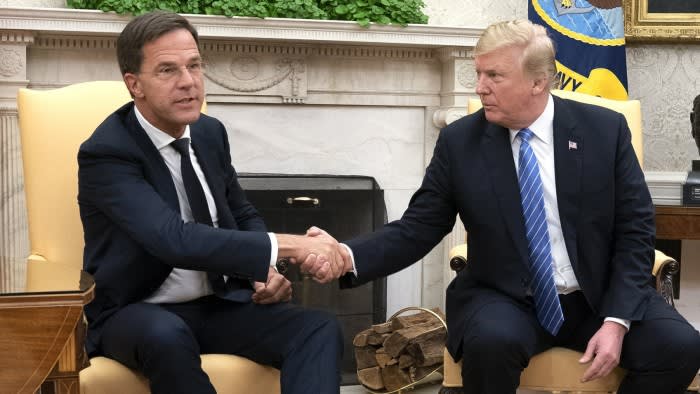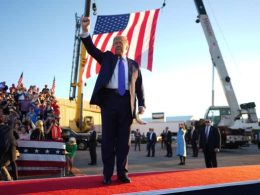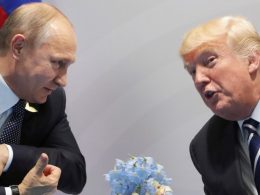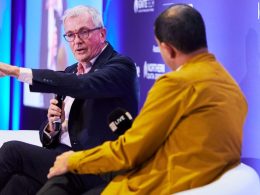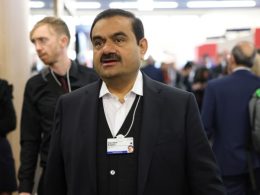Unlock the White House Watch newsletter for free
Your guide to what the 2024 US election means for Washington and the world
European leaders have vowed to work with Donald Trump after he declared victory in the US presidential election, even as their senior officials voiced anguish at the implications of his return to power.
The Republican candidate on Wednesday claimed a second four-year term in the White House after results showed him winning key swing states in a chastening night for his Democratic rival, Kamala Harris.
The prospect of another Trump presidency has spooked Europe after he vowed to stop military aid for Ukraine in its defence against Russian aggression, and threatened to withdraw US support to Nato allies who fail to spend sufficiently on defence. He has also campaigned on plans to impose blanket tariffs of up to 20 per cent on European imports.
Kyiv depends heavily on US military support in its fight against Russia’s invasion which European officials know that the EU cannot replace. Many European capitals also fear Trump could force Kyiv into a deal to end the war that would benefit Russian President Vladimir Putin.
Nato secretary-general Mark Rutte, a former Dutch prime minister, said he looked forward “to working with [Trump] again”, reminding the president-elect that the alliance helped “to advance US interests, multiply American power and keep Americans safe”.
“Ready to work together as we have done for four years,” said French President Emmanuel Macron. “With your convictions and with mine. With respect and ambition. For more peace and prosperity.”
European diplomats on Wednesday voiced shock at the scale of Trump’s victory in key swing states, noting that by winning both the popular vote and the electoral college, he would likely be even more emboldened in his America First agenda.
“I’m afraid,” said one senior EU official involved in the bloc’s war room talks set up in preparation of a potential Trump presidency.
“On trade, it will be bad,” said a second senior EU official. “And Ukraine is in big trouble.”
Macron said he had spoken with German Chancellor Olaf Scholz, and that the two men would “work towards a more united, stronger, more sovereign Europe in this new context”, by continuing to co-operate with the US while also “defending our interests and our values”.
The German government’s transatlantic co-ordinator, Michael Link, said Trump’s re-election meant that both the EU and the European pillar of Nato had to be strengthened and avoid divisions. “We can’t just passively wait for what Trump will do, or what Putin will do . . . We have to become stronger. And the government has to do that, now.
“We have to make clear what we expect of the US, that it must fulfil its Nato obligations,” he said on German radio. “And that if it disengages from Ukraine, in the end that would only help China. That if Russia wins in Ukraine, China wins too.”
Ursula von der Leyen, the president of the European Commission and a former German defence minister, urged Trump to “work together on a transatlantic partnership that continues to deliver for our citizens”, noting that “millions of jobs and billions in trade and investment” depended on EU-US economic ties.
Italy’s rightwing premier Giorgia Meloni, who is closest to the Trump world among leaders of Europe’s biggest economies, extended her “sincere congratulations” to the Republican. She added that Italy and the US had a “strategic bond, which I am sure we will now strengthen even further”.
“The biggest comeback in US political history! Congratulations to President Donald Trump on his enormous win. A much-needed victory for the world,” said Hungary’s Prime Minister Viktor Orbán, the EU’s most prominent illiberal leader and Trump supporter. Discussions on how to respond to Trump’s new presidency will dominate a summit of the EU’s 27 leaders that begins on Thursday in Budapest.
Alice Weidel, leader of the far-right Alternative for Germany party, said Trump’s victory could be a model for Germany. “It was a clear statement against mass immigration, crime and economic decline, against a failed climate ideology, a failed gender ideology and the policy of war,” she said on German radio.
Additional reporting by Marton Dunai in Budapest, Paola Tamma and Andy Bounds in Brussels and Amy Kazmin in Rome
Source link




